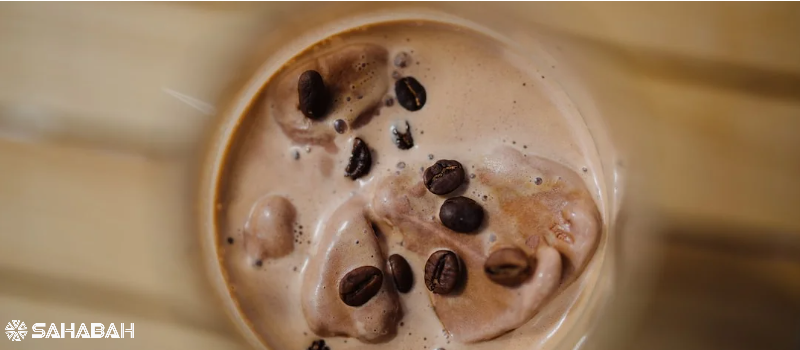Since first launching in Aldi stores in 2013, Choc Ums have ascended as an icon of affordable indulgence for UK shoppers. Known for their moreish combination of smooth milk chocolate and light shortbread crunch, these biscuit bars have won over millions with their seductive sweetness.
But for Britain’s 2.7 million Muslims navigating the modern food landscape, one pressing question arises around this snacktime staple– are Aldi Choc Ums halal?
This comprehensive guide will scrutinize every ingredient, production method and company claim to deliver a verdict on whether devout followers’ values align with their chocolate cravings.
We’ll uncover crucial considerations like:
- Primary components comprising Choc Ums
- Assessing conformity to Islamic dietary laws
- Reliability of Aldi’s undefined “halal assurances”
- Accessing reliably certified substitutes
So for Muslims deliberating if this classic qualifies as a permissible indulgence, let’s unravel the evidence.
Principles of Halal Foods in Islam
To judge if any edible product meets halal criteria, we must outline core rules in Islamic doctrine:
Forbidden Ingredients
- Pork, blood or meat from improperly slaughtered animals
- Alcohol or intoxicating substances
Production Protocols
- Prevention of cross-contamination with haram foods
- Use of halal-permissible ingredients through entire supply chain
- Avoidance of doubtful or questionable ingredients
Any sweets or dessert hoping for halal-compliance must adhere to this strict guidance. Now equipped with core criteria, we can properly investigate Aldi’s insignia biscuit bar.
Inside the Choc Um’s Cult Appeal
Before scrutinizing their halal eligibility, let’s unbox the components crafting Choc Um’s nostalgic flavor.
Each 60g Choc Um twin pack serves up:
- 26% milk chocolate coating
- Sweet biscuit base
- Smooth chocolate filling
- A calorie count of ~136 kcal per biscuit bar
This winning combination of chocolatey decadence between light shortbread makes for the ultimate mid-day craving cure.
But do these classic biscuit bars uphold their integrity under Islamic inspection? Let’s break things down ingredient-by-ingredient.
Auditing Every Choc Um Ingredient for Halal Compliance
As learned, ensuring strict avoidance of any non-permissible components is paramount for halal food validation.
Here is the published ingredients list for Aldi’s Choc Um’s requiring our scrutiny:
Ingredients: Milk Chocolate (26%) (Sugar, Cocoa Butter, Cocoa Mass, Skimmed Milk Powder, Emulsifiers (Soy Lecithins, E442), Flavourings), Wheat Flour, Sugar, Vegetable Oil (Palm), Cocoa Mass, Emulsifiers (Soy Lecithins, E476), Raising Agents (Sodium Bicarbonate, Ammonium Bicarbonate), Cochineal, Salt, Flavourings.
Let’s examine each constituent closely:
Milk Chocolate Coating (26%)
Primarily comprises halal-approved elements like sugar, cocoa butter and milk powder. Emulsifying agents require further analysis.
Soy lecithin – Derived from soybeans, typically halal. But scrutinize if alcohol utilized in processing.
E442 – Ammonium phosphatides used frequently in chocolates. No evidence of haram origins but confirm purification methods used.
Wheat Flour – Suitable for halal category. Ensure processing avoids cross-contamination with prohibited grains.
Sugar – Typically beet or cane sugar which conform to halal standards. Check origin and refining method.
Vegetable Oil (Palm Oil) – Halal appropriate sources. Pure palm oil avoids alcohol usage in processing.
Cocoa Mass – Ingredient produced from cocoa beans. Naturally halal barring processing contaminants.
E476 – Polyglycerol polyricinoleate (PGPR) – An emulsifier often derived from halal corn, soy or glycerin sources. But verifying actual derivation critical as animal extracts occasionally used.
Raising Agents (Sodium/Ammonium Bicarbonate) – Typically compliant leavening agents. Confirm purification procedures.
Cochineal Extract – Red food coloring potentially derived from insects. Polarizing ingredient for Muslims. Some accept while others avoid.
Salt – No evidence of additives that would impact halal status.
Flavorings – Require further breakdown by Aldi. Could contain extracts or alcohol forbidden under halal laws.
This comprehensive audit shows Choc Um’s have no clearly labeled haram ingredients. But for followers avoiding insect extracts, the cochineal component merits concern. And do undisclosed “flavorings” harbor covert non-halal elements?
The Hazy World of Food Additives & Halal Integrity
While no overtly prohibited contents seem present, careful Muslims know even permitted components can mask haram derivatives through processing methods.
Here are concerning additives that frequently evade scrutiny:
E-Numbers
Though coding appears innocuous, many E-numbers conceal animal-based ingredients like:
- E631 (Pork Extracts)
- E901 (Beeswax)
- E904 (Shellacresin)
Enzymes
Frequently utilized to improve functional properties. Can be harvested from animals like pigs and cows. Also risk alcohol residue contamination during extraction.
Processing Aids
Substances assisting production efficacy. Examples like bone and gelatin char occasionally slip through.
For halal-compliant foods, tracing precise additive origins and production methods is paramount yet extremely difficult given opaque supply chains.
Does Aldi offer any evidence of exerting such needed supply scrutiny with Choc Ums?
Unpacking Aldi’s Vague Halal “Assurances”
Seeking clarity on Choc Um’s halal integrity, direct inquiries were submitted to Aldi’s customer support.
Their statements offered this generalized stance:
“None of the ingredients used in Dairyfine Choc Ums contain alcohol, pork or pork derivatives. All ingredients used also comply with Islamic Sharia dietary guidelines.”
But note the assurance lacks specifics around:
- Cochineal insects extract suitability
- Supply chain tracking procedures
- Prevention of manufacturing cross-contaminations
Additionally no references to formal halal certification bodies or auditing procedures are mentioned to substantiate claims.
While this suggests Aldi believes their formulations align with Muslim principles, for stricter adherents, uncertified implications made by any self-interested company fail to inspire confidence in a beloved product.
So for followers seeking additional validation, where can alternative halal sweets be found?
Accessing Credible Halal Sweets & Chocolates in UK Shops
Thankfully obtaining halal-verified confections matching Choc Um’s delightfulness gets easier every day across top British retailers.
Tesco
Tesco’s dedicated halal personal care and food sections offer approved chocolate bars and assorted biscuits.
Sainsbury’s
Sainsbury’s stocks one of the UK’s largest certified ranges covering cakes, desserts and other sweets.
Asda
Asda’s large budget-friendly halal offerings ensure affordable indulgence for all with items starting at £1.
Plus trusted halal certification symbols like the familiar crescent moon & star emblem or HMC trademark should provide added assurance for cautious buyers.
For even simpler shopping, apps like HalalCheck enable scanning item barcodes to confirm halal status right from your trolley!
Closing Verdict: Halal Compliance Remains Difficult to Verify
In conclusion, while free of clearly prohibited ingredients, Aldi Choc Ums cannot claim definitive halal compliance without documentations validating:
- Supply chain free of cross-contamination
- Confirmed permissible additive sourcing
- Oversight by a certifying halal authoritative body
For Muslims prioritizing peace of mind aligning faith and food, verified alternatives exist offering accountability where uncertified crave classics might disappoint.
Still, less strict followers may accept Aldi’s opaque “assurances” trusting no overt alcohol or pork traces linger.
Either way, I hope this complete guide to evaluating Choc Um’s halal qualifications offers helpful perspectives on aligning Islamic values with the beloved sweet snack! Please let me know if any areas warrant further information.
Frequently Asked Questions: Is Aldi Choc Um’s Halal?
Aldi Choc Um’s Halal status is subject to its halal certification. It’s important for consumers to examine the ingredients to ensure compliance with halal and to make informed decisions.
What is the halal status of Aldi products?
The halal status of Aldi products varies, and consumers should examine the ingredients and look for halal-certified products to ensure compliance with Islamic dietary guidelines.
Do Aldi products contain non-halal ingredients?
Some Aldi products may contain non-halal ingredients. It’s important for consumers, especially Muslims, to carefully examine the ingredients to determine the halal status of the product.
What are some common ingredients used in Aldi products?
Common ingredients used in Aldi products include carotene, gum arabic, carnauba wax, cocoa powder, starch, and titanium dioxide, among others.
How can I ensure that Aldi products are halal?
Consumers can ensure that Aldi products are halal by examining the ingredients, looking for halal-certified products, and making informed decisions about their purchases.
Why is it important for Muslim consumers to know the halal status of Aldi products?
It’s important for Muslim consumers to know the halal status of Aldi products to ensure that they are compliant with Islamic dietary guidelines and to make informed choices about their purchases.
Does Aldi provide information on the halal status of its products?
Aldi may also provide information on the halal status of its products to assist consumers, especially those following halal dietary requirements, in making informed decisions.
What are some non-halal ingredients that consumers should be aware of in Aldi products?
Some non-halal ingredients that consumers should be aware of in Aldi products include glazing agents, brilliant blue, fatty acids, and other ingredients derived from animal sources.
How does Aldi ensure compliance with halal standards for its products?
Aldi ensures compliance with halal standards for its products by carefully examining the ingredients used and offering halal-certified products that meet the requirements of Muslim consumers.
What should consumers know about Aldi’s approach to halal and haram products?
Consumers should understand Aldi’s approach to halal and haram products, examine the ingredients, and make informed decisions to ensure that they comply with their dietary and religious requirements.





